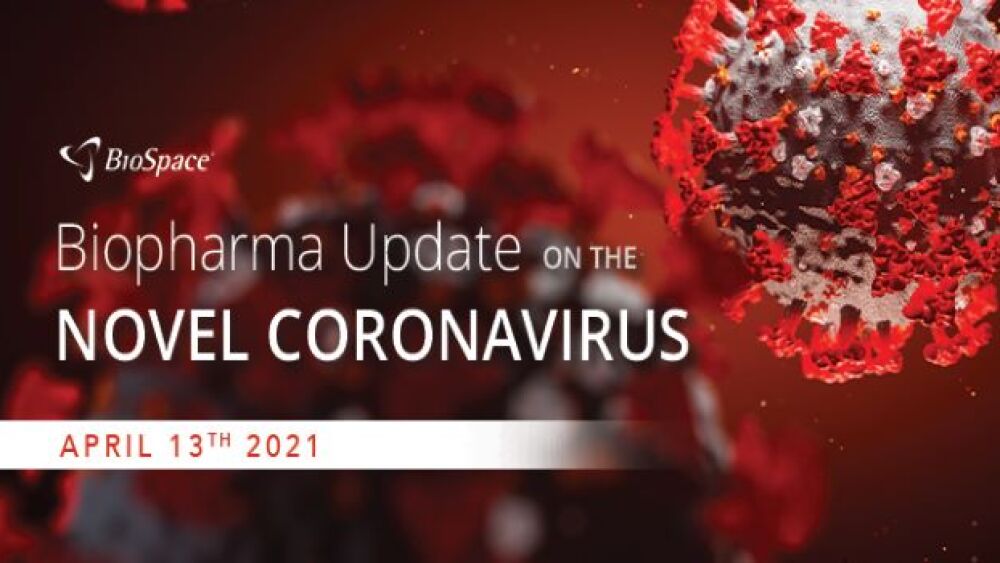Please check out the biopharma industry’s COVID-19 stories that are trending for April 13, 2021.
News information is not all-inclusive and updates are published once a week on Tuesdays.
Here’s a look at some of the top COVID-19 news over the past week.
Moderna issued a statement that said a safety study after 64.5 million doses of its COVID-19 vaccine is not associated with blood clots.
A new study in Israel looking at variants against the Pfizer vaccine has found that the South African variant may be able to escape some vaccine protection. This means that there are some people who get infected despite being vaccinated and are being called “breakthrough” COVID-19 cases.
A study published last week in the Canadian Medical Association Journal (CMAJ) looked at virtual samples of 305 children and adults who were infected with COVID-19. The study found that children had lower viral loads and may transmit COVID-19 infections less than adults.
Regeneron Pharmaceuticals announced the results from its Phase III trial of recently infected asymptomatic COVID-19 patients for its REGEN-COV (casirivimab with imdevimab) antibody cocktail. The therapy decreased the overall risk of the patients progressing to symptomatic COVID-19 by 31%, which was the trial’s primary endpoint. It also decreased the overall risk of progression by 76% after the third day. In addition, REGEN-COV decreased the duration of symptoms and significantly reduced viral levels.
AstraZeneca’s diabetes drug Farxiga (dapagliflozin) failed to reach endpoints in a Phase III study as a potential treatment for hospitalized COVID-19 patients serious risk of developing complications.
Researchers are leveraging the messenger RNA (mRNA) technology used to develop the Pfizer-BioNTech and Moderna COVID-19 vaccines for possible treatments for a range of other diseases, including HIV and cancer.
Six months after a COVID-19 diagnosis, more than 33% of people exhibited some form of brain damage, according to a study appearing in Lancet Psychiatry. Mortality, therefore, is not the only concern. While COVID-19 can lead to serious respiratory, pulmonary and cardiac issues, it also has other severe, far-reaching neurological consequences.
The global pandemic played a key role in an economic downturn with lockdowns and work interruptions. Despite those woes, the heads of some biopharmaceutical companies developing vaccines that are playing a key role in the battle against COVID-19 saw boosts in their annual compensation. BioSpace takes a look at the annual compensation for the chief executive officers of vaccine developers. Click here to read more.
The National Institutes of Health (NIH) initiated tests of a new COVID-19 vaccine from Moderna targeting the South African variant, B.1.351. It is being tested in about 210 healthy adults. It will also include about 60 adults who participated in Moderna’s first COVID-19 vaccine trials last year and about 150 people who have not yet received a vaccine. The trial is recruiting volunteers in Atlanta, Cincinnati, Seattle, and Nashville.
RedHill Biopharma’s Phase II/III trial of Yeliva (opaganib) in hospitalized severe COVID-19 pneumonia patients received a unanimous recommendation to continue after a fourth independent Data Safety Monitoring Board (DSMB) safety review. The recommendation was based on unblinded safety data from the first 255 patients who received treatment for 14 days.
Merck and Ridgeback Biotherapeutics announced preliminary results from Ridgeback’s Phase IIa trial of molnupiravir in COVID-19. They reported on one secondary objective, demonstrating a decrease in days to the negativity of infectious virus isolation in nasopharyngeal swabs, as determined by isolation in Vero cell line culture. The results were presented during Science Spotlights at the 2021 Conference on Retroviruses and Opportunistic Infections (CROI 2021).
The fear caused by COVID-19 provides an “in” for fraudsters to exploit thousands of Americans by posing as biotech companies. The Maryland U.S. Attorney’s Office announced they had seized three domain names last week. The websites “healthbridgescience.com,” “global-pandemic-vaccines.com” and “genobioscience.com” all claimed to be biotech companies but their intentions were much more sinister.
Eli Lilly and Company and Incyte announced that their Phase III COV-BARRIER study of Olumiant (baricitinib) plus standard of care (SoC) compared to placebo plus SoC failed to hit statistical significance against COVID-19 for its primary endpoint. However, there were other promising results in the study.
A recent study from Ben-Gurion University of the Negev (BGU) found that isolated molecules from probiotic-rich dairy products could have potential as novel drug candidates for fighting against pathogenic bacteria and treating inflammatory diseases, including the cytokine storm related to coronavirus disease 2019 (COVID-19). Findings from the study were published in the peer-reviewed publication Microbiome.
Sound Pharmaceuticals announced the backing of the National Center for Advancing Translational Sciences (NCATS) for its planned Phase II trials of its oral anti-inflammatory SPI-1005 to treat patients with moderate or severe COVID-19, the first known trials for a therapy targeting main protease (Mpro) and papain-like protease (PLpro) on the SARS-CoV-2 virus. The $3.1 million NCATS grant will help the company test SPI-1005 in two trials, both OK’d by the U.S. Food and Drug Administration (FDA) last August.
According to the Financial Times, shareholders have submitted hundreds of proposals to the leadership teams of companies seeking answers to environmental and social issues. In the biopharmaceutical industry, shareholders have raised concern over the pricing of vaccines and therapeutics used in the ongoing battle against COVID-19.





